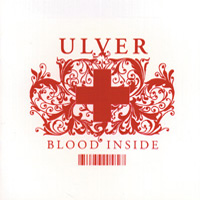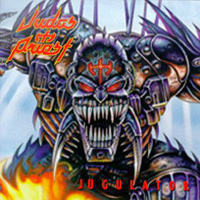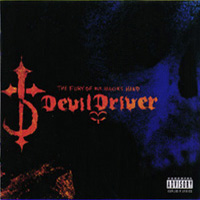 Ulver
Ulver
Blood Inside (The End)
An interview with Kristoffer Rygg (AKA Garm, Daddy G, Trickster G., Garm Wolf, etc.)
By Daniel Lukes
Arguably the most chilling and compellingly eerie record of 2005 was Ulver‘s Blood Inside, in which Oslo’s premiere musical chameleon, Kristoffer Rygg (AKA Garm, Daddy G, Trickster G., Garm Wolf, etc), dressed up as a surgeon to get in under your skin and as a Pope to penetrate your soul. In the years since debuting as a buzzing black metal band, Ulver have undergone a myriad of transformations, finally settling, for the moment at least, on an enthralling mix of operatic prog-rock pomposity and metallic trip-hop exuberance, imbued with a sense of utter, cosmic dread. Put simply, if you’ve become a little jaded at the earsplitting cacophony much “experimental” music seems to offer these days, then try the new Ulver on for size.
From the office of his Norwegian record label, VME, a somewhat argumentative Rygg took the time to answer questions about life, death, fatherhood, religion, and his new band, Head Control System.
How are you?
I am tired. I’m tired but fine.
Why are you tired?
Woke up early, two kids. Yeah. It’s been a long day.
I didn’t know you had kids.
Two. Ha ha.
How old are they?
Almost three, and almost one. So they’re a handful, I can tell you.
 So, the usual question: Has fatherhood radically changed your view on life?
So, the usual question: Has fatherhood radically changed your view on life?
No, I wouldn’t really say it has. It’s changed my way of living, but it hasn’t changed my view of life. My view of life is, as always completely bleak… ha ha. Nah, I guess it does add some feeling as to what’s important, or whatnot, but I think there’s a separation between the thinker in me and the family guy, so to speak. And that’s not the American Family Guy that you see on TV every week.
What have you been up to lately?
I recently came home from Portugal, where I sang on a record by a band called Head Control System, which has been like a recreational project for me. Some small details need some fixing, but seven tracks out of ten tracks are mixed and ready, so it’s shaping up. It’s going to be out early next year, but we haven’t set a date yet. We haven’t even set a label yet. [Murder Nature came out in January on The End Records.]
How did that project come about?
I had this persistent and finally persuasive Portuguese man mailing me all the time, sending me sound bits and videos of recordings, and initially, I thought it was too straightforward, but I kind of immediately noticed the quality of it, and after a while, I was nodding my head to it and realized it was catchy stuff and I could probably do a decent job as mere vocalist, and I felt that it would be good to do something else for a change. So there you have it.
Is it refreshing to work as a vocalist with someone else’s music as opposed to producing your own?
Yeah, it’s different when there’s someone else in charge. Since it’s not my heart-child, it’s easier for me to go in like some sort of old pro, go in and do the job and do it as best as you can, and walk away from it again. Ulver is in my mind 24 hours a day.
When I heard the new Ulver record, I thought it synthesized a lot of the things Ulver have been about over the years. What were you aiming for with Blood Inside? Did you deliberately want to do something a bit more concise than in the past?
In a way, yes. Our only kind of initial idea was that we’ve been drifting off into these obscure headspaces for so long now, so we really needed to make a record that went a bit back to like more traditional song formats, though it’s hardly very traditional songwriting. At the same time, we felt we needed to make a record with songs, and also maybe we felt like we had to start working with words and lyrics again. We’d been keeping the music so deep and stripped and naked for a while, it was important for us to enter into it with a more rock’n’roll attitude.
 Talking more about the thematic side of it, I see a medical theme.
Talking more about the thematic side of it, I see a medical theme.
Yeah, I think that kind of entered into our headspace a bit, maybe at first by accident, then it became like a very tangible environment that we used, sometimes as a metaphor, other times to create an environment. It’s not like we started writing with the idea that this is going to be a hospital record.
In contemporary art, there’s a lot of stuff about the pharmaceutical industry. Like Damien Hirst, for example. I was wondering what your take on the pharmaceutical world was: Some industries create disease and others cater to “curing” it…
I think what you’re talking about is one thing, and is interesting in one respect. For us, it’s more a matter of the hospital being the place you come and the place you go, usually, and it’s very sterile. It’s very white, so it’s got those associations. And it’s a place of suffering, and a place for hope, maybe, and a place of distress, so it’s a very tangible environment that ties together a lot of the very basic things that we write about. What we write about is life, death, hope, fear, all these things that are really simple. It’s really not very fancy, and the hospital just kind of became a very natural environment to kind of place these ideas or these themes into.
The hospital also has its own aesthetic that you’ve captured here.
Exactly: It’s white, it’s sterile. That’s the standard requirement here: Free from filth, to keep it free from germs and viruses, but at the same time, it’s usually the birthplace of a lot of disease and viruses. So the hospital is a paradox, in a way, and the paradox is interesting to us.
It’s kind of intertwined with the religious element: I’ve lived in America for a while, and an atheist is a rare thing here. Do you think the world is becoming more religious these days?
More compulsively religious, in a way that’s probably more intertwined with politics than any real spirituality. I also think that religion is usually the last resort for many people. You don’t really believe until you have to, or until there’s nothing else to hold onto. You have this vague, abstract idea of something that gives you hope. For us, there is no hope. You’re going to die, and that’s that. It’s all black.
 You do write about religion quite a bit.
You do write about religion quite a bit.
Yes. The gods are there, in a sense, so why not use them for what they’re worth? I’m not saying they’re worthless, or that religion isn’t a living, breathing thing, because in a more metaphysical sense, it certainly is. In a Jungian sense, all the collective energy put into these ideas makes these ideas come to life, so it’s not like they’re unimportant. In one respect, I might be the least god-fearing or god-believing person on Earth, but from another perspective, I’m totally religious. It’s all a matter of predilection, I could say.
In what way would you say you’re religious?
I don’t know if I should answer that. As I just told you, in some ways, I’m very non-religious, but if you view it from a different perspective, I’m very preoccupied with religion itself. Not only me, but the three of us, the guys in the band, we love pathos, when things have a real heart. For me, the whole ’90s ironic culture thing was just the worst. I love art, and not pomposity, because pomposity is a word that’s put to that in a negative sense, but I love pathos, and religious ideas have that, and religious iconography and religious symbols, and it’s kind of like the visual guardians of morality.
The “It Is Not Sound” video struck me as a very interesting commentary on the things that’ve been going on in the world over the last four or so years, the notion of killing someone in the name of religion, the self-destructive element, the masochist nature of those events.
And then, of course, the Pope died, so you have that element! Ahhh, I mean, it’s not a one-track commentary. To tell you the truth, our basic idea was about these high-ranking members of some religious order, these big and in many ways self-delusional ideas of your own grandeur. In that video, we’re trying to say that you can fool yourself, but in the end, you’re gonna die. The basic climb-to-fall thing, in a religious context. But, at the same time, that’s what makes it interesting, I guess. It reflects differently on different people, as you exemplify with your own interpretations.
In the song “Christmas” you say “All is mystery,” yet we live in an age which thinks we have all the answers…
I don’t really think we do. I think we live in an age where everyone’s completely fucked-up and are very much aware that they’re totally unaware. As far as science goes, it’s the same idea: By acquiring so much information, they become increasingly aware that they have to change the whole scientific outlook, and it’s all entering into quantum physics that takes it beyond traditionality.
Do you think we’re more confused than in the past, when we had certainties given to us by religion?
Religion had a stronger element of truth to it because people were generally uneducated. Or more believing, more naïve, in a sense. At least in the Western parts of the world today, we all walk around with “luxury problems.” We don’t have any real hardships in life, so it takes our mind off the mere struggle to survive on a day-to-day level, and rockets the mind off into space instead, and that’s when the problem comes. I mean, look at the fucking amount of Prozac being written out today, it’s ridiculous. It’s like 10% of humanity is Prozac victims…
So you think that because we don’t have to go around looking for food all day, all this excess mental energy…
Well, that’s like the very, very mundane way of putting it, but in a way, it’s probably true. We have too much time to think and be artists and do all this really, ultimately meaningless bullshit that we do as human beings. You’re a journalist and I’m a musician, and in the end, it’s really not that important, but we occupy our minds with these things because we can, I guess. No offence…
None taken. Talking about the song “Your Call,” it’s my favorite song on the album.
That’s my favorite song too, actually. So kudos to you for that.
For me, it brought to mind that feeling of dread where you’re worried about someone, someone not being OK, or dying. How did it come about?
Again, you’re kind of interpreting it your way, and I think that’s a good thing. Our idea was that this “no one” that we’re talking about is becoming “someone” in a strange way during the course of the lyrics. For us, it’s almost like a ghost narrative. Then again, the hospital is there… It’s like a “working the night shift” reference, but our idea is the no one is becoming someone. And it’s someone dying in all this stuff, so it’s about death. It’s hard for me to be any more specific than that, but again, as you see it, it’s lost in translation.
Musically, what have you been listening to lately?
I don’t have too much time to listen to music, but I had a thing for the Mimicry Records label for a while. Sleepytime Gorilla Museum and Secret Chiefs 3 and stuff like that. For me, it’s interesting, because that’s also a label that works with musicians who work with just putting these ridiculously diverse things together and it sounds new to me. I’m always interested in music that surprises me
Do your children enjoy your music?
My son, he’s kind of into the Head Control System thing, because it’s more immediate-sounding. It’s basic: Drums, guitars, bass guitar, vocals. It’s catchy, it’s 4/4, so he’s jumping up and down and he says “Play the daddy thingy music” is what he says.
What are you going to do for the rest of the day today?
Do you know what? I actually have my first day off for like six weeks or something, so I’m going to go home, be alone, and drink some good Scotch whiskey and probably watch some DVD I didn’t manage to watch yet and get a little pissy and go to bed. That’s my plan for the day. To be alone.
(www.jester-records.com/ulver)



